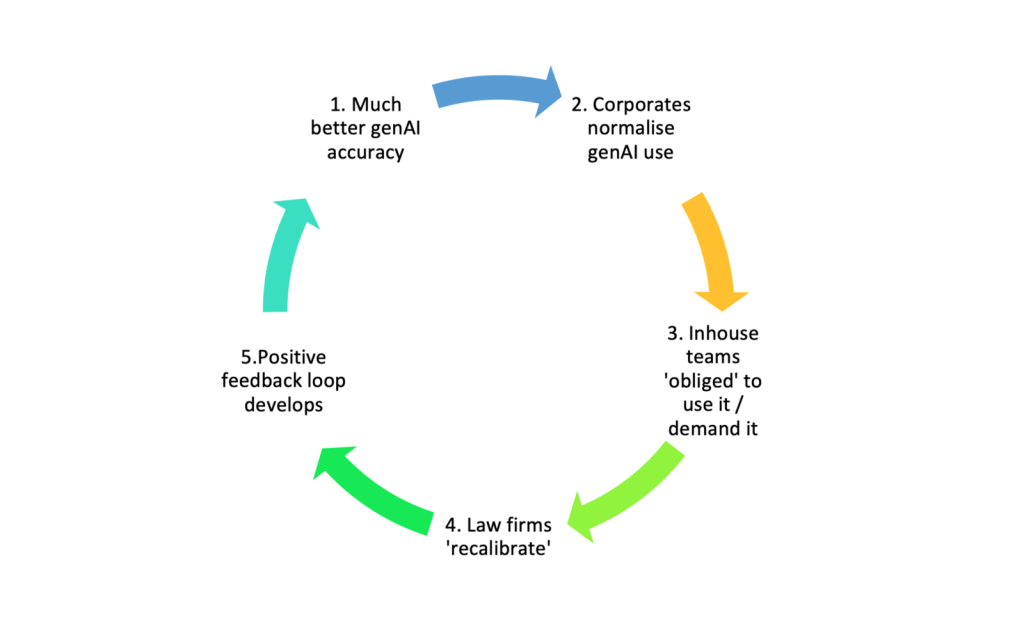
The Evolution of Legal Practices in Response to GenAI
Recent findings from a survey of over 800 UK lawyers conducted by LexisNexis indicate that the legal sector is beginning to embrace significant changes in its business model due to the influence of generative artificial intelligence (genAI). Notably, 39% of private practice lawyers anticipate that their firms will modify their billing practices as a result of AI adoption, a substantial increase from 18% earlier this year.
While these expectations are growing, the actual implementation of such changes remains minimal. Currently, only 2% of respondents report having modified their pricing structures in direct response to genAI. Nonetheless, this statistic is important; it marks the beginning of a shift where legal professionals are starting to reexamine traditional billing methods, particularly the reliance on billable hours.
The Potential for Change
The critical question now is whether this 2% figure shifts over the coming years. There is a palpable sense of anticipation that transformation will occur, reflecting how expectations can often precede tangible change. However, it’s also feasible that the percentage could plateau for an extended period. Just because there is a growing belief in imminent systemic changes does not guarantee immediate action.
Ultimately, client demands will be a pivotal force in propelling these changes. As clients begin to express expectations for more flexible fee structures—especially for projects where significant time savings can be achieved through genAI—legal firms will likely respond. Matters involving high volume or repetitive tasks may be at the forefront of this shift.
Client Expectations and Industry Traditions
Interestingly, while many clients are calling for change in pricing practices, they themselves may not be taking proactive steps to demand it. This is akin to members of a support group discussing the collective desire to quit smoking, aware that it is harmful, yet few actually take that first step until faced with a personal crisis.
How can we catalyze this change? Analytical models suggest a roadmap for the future of the legal industry:
- As genAI technology matures, its increased accuracy and ease of use could sway even the most skeptical practitioners, allowing for broader deployment across various sectors.
- Major corporate players—banks, insurance companies, and governments—are expected to normalize the use of genAI tools, integrating them into their operations where beneficial.
- In-house legal teams, which have steadily acclimated to genAI, will align more closely with the expectations of the broader organization. They will be expected to adopt these tools internally and advocate for their use among external advisors.
Adapting Legal Practices
Law firms have, for some time, been attuned to shifting client needs and have cautiously explored the integration of genAI tools. The process of adaptation is, however, often dictated by a prevailing sentiment in client demand. While firms are capable of rapid change when necessary, many remain hesitant to fully embrace new models just yet.
This could create a reinforcing cycle: the more legal firms utilize genAI, the more robust the technology becomes, improving its overall performance and reliability. As the legal profession increasingly integrates these tools, expectations among clients will rise, thereby compelling firms to reevaluate their strategies. Consequently, legal professionals moving from traditional firms to in-house roles could further propagate this cultural shift surrounding technology and business models.
Timeline for Transformation
Adapting to this evolving landscape may be a gradual process, but change seems inevitable. The key issue lies in the pace of this transformation—whether it will accelerate in five, ten, or more years remains to be seen.
Historical trends within the legal market also suggest that once a significant portion of firms, say 20% of UK 100 listed firms, adopts a particular operational model, the remaining firms will likely follow suit to avoid being left behind.
Thus, the crucial focus is on identifying that pivotal trigger point. Given the current 2% adoption rate, the pressing inquiry surrounds how long it will take to reach a figure closer to 20% and what timeline we should anticipate to get there.
The Current Utilization of GenAI in the Legal Sector
Interestingly, the LexisNexis survey revealed that 41% of UK lawyers are already using genAI in some capacity. This impressive figure highlights a growing acceptance of technology in the industry. Additionally, 71% indicated that their primary motivation for employing genAI is to expedite workflows, underscoring its practical benefits.
This momentum indicates a positive trend toward embracing technology in legal practices, emphasizing the importance of innovation in improving efficiency and service delivery.
HAL149 is a leading AI company specializing in developing personalized AI assistants for businesses. Our AI models, based on tailored GPT algorithms, enhance efficiency in tasks such as customer service and content generation, empowering companies to maximize their growth potential. Our mission focuses on aligning human work with AI capabilities, ensuring technology acts as an aid to enhance human talent rather than replace it. Reach out to us for more information on how we can help your business thrive:
- Website: HAL149
- Contact Form: Contact Us
- Email: hola@hal149.com
